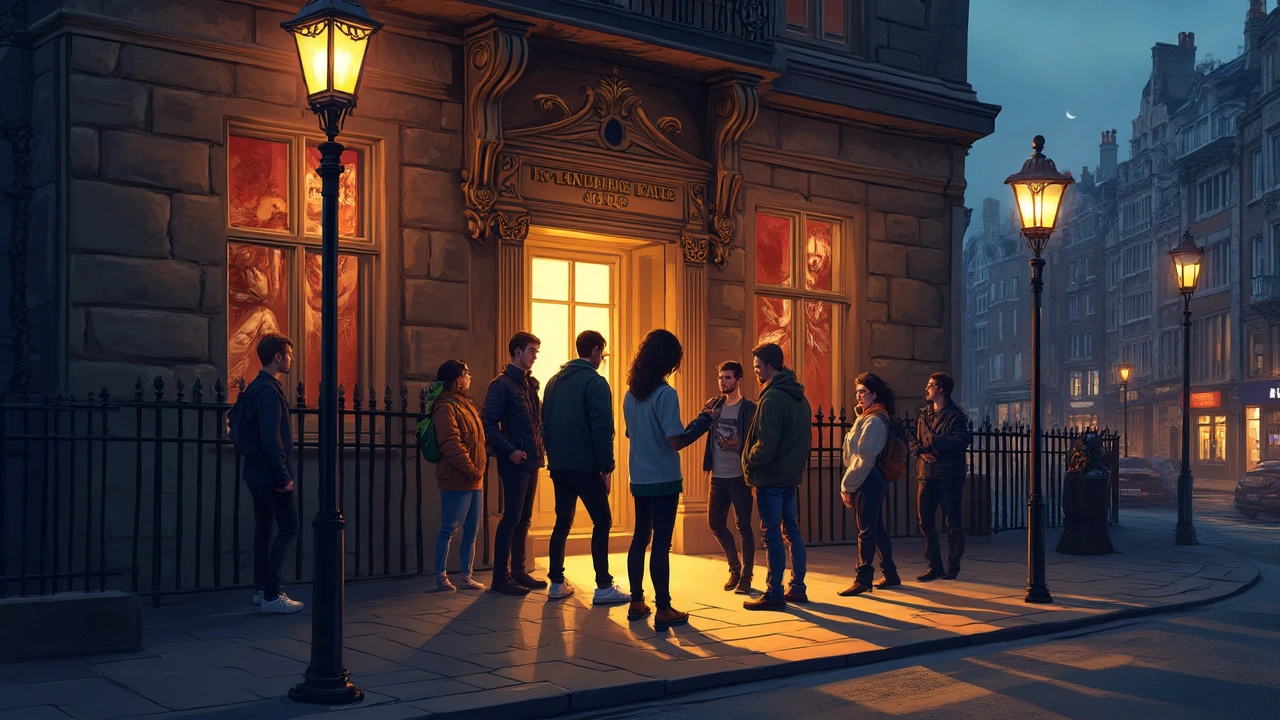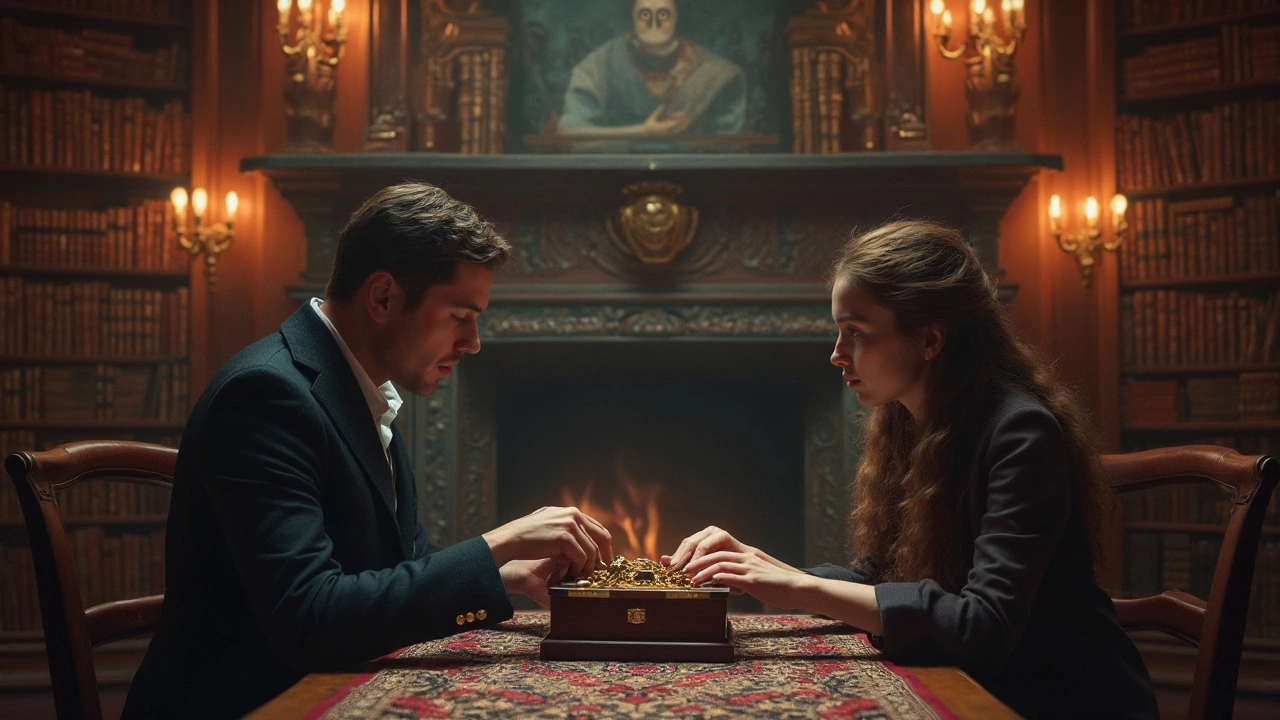Do People Get Claustrophobic in Escape Rooms?
 Apr, 13 2025
Apr, 13 2025
Ever tried solving puzzles while racing against the clock, all locked up in a room with a group of friends? Sounds like a blast, right? But for some, the idea might inspire more jitters than joy, and that's where claustrophobia sneaks into the conversation. Escape rooms can be a thrilling experience, but being trapped with limited space and time pressure might set off anyone with claustrophobia. So, what's the deal here?
Let's break it down. Claustrophobia is a pretty common anxiety disorder, where the fear of tight or crowded spaces can make your heart race a bit faster than usual. Now, the canned notion is that escape rooms might kick this fear into high gear. But hold on a sec! Not all escape rooms are created equal, and not all fears unfold the same way.
- Understanding Escape Rooms
- Claustrophobia and Its Triggers
- Managing Anxiety in Escape Rooms
- Tips for a Comfortable Experience
Understanding Escape Rooms
So, what’s the buzz about escape rooms? Picture this: you and your mates are dropped into a themed room - think anything from a haunted mansion to an underwater submarine. Your mission is to crack codes, solve puzzles, and piece together clues to 'escape' before the clock runs out. That’s the essence of an escape room adventure.
Originating in Japan around 2007, escape rooms have exploded in popularity across the globe. It's a neat blend of live-action video games and theatrical storytelling that ropes in a wide audience, from casual gamers to seasoned puzzle solvers. In Australia alone, there are hundreds of escape rooms, each offering unique themes and challenges.
One of the key features is the sense of immersion. From soundtracks to set designs, everything is crafted to make you feel part of the story. You’re not just solving puzzles; you’re living out a tale. This immersive experience is what keeps escape room enthusiasts coming back for more.
Escape rooms vary significantly in size and complexity. Some rooms are vast and spacious, hosting up to 10 people, while others are cozier, designed for smaller groups. Usually, you’ll find themes categorized by difficulty – beginner, intermediate, and advanced – catering to different skill levels and preferences.
Anxiety might be a concern for some folks, but it’s worth noting that many escape rooms offer hints and guidance if you’re stuck. Plus, there’s always a game master watching over to ensure everything runs smoothly and to assist if needed. They can offer a reassuring presence if the puzzles get a bit too puzzling!
By understanding what to expect, you can prepare yourself or your friends who might feel anxious about tighter spaces. Knowing you can choose the room size and difficulty can help ease into the experience, making it an adventure that’s more fun than fear-inducing.
Claustrophobia and Its Triggers
Alright, let's dig into the nitty-gritty of claustrophobia. For those not in the know, this anxiety disorder revolves around an intense fear of being trapped or confined. It's not just the walls that seem to close in—it's the feeling of being stuck without any escape route that can send someone spiraling.
So, what kicks this into high gear? Typical triggers include enclosed areas like elevators, small rooms, or even crowded venues. Escape rooms, with their locked doors and enclosed setups, can sometimes fit that bill perfectly.
One quirky thing about claustrophobia is that it's not always about the space itself. For many, it's more about the lack of control or the inability to leave when they want to. You know what they say, the mind is a tricky place!
What plays a role in making the fear tip over? Definitely the size and layout of the space, the number of people in there, and even the pressure of having to solve puzzles while battling the dreaded countdown. Imagine the tension when the clock's ticking down!
- Room Size: The bigger the space, the less likely it is to press those panic buttons.
- Team Dynamics: Being with a crew you're comfy with can help ease anxiety.
- Lighting: A well-lit room often feels less stressful than a dark, dingy one.
Here's an interesting stat: About 5 to 10% of the world's population deals with some form of claustrophobia. While it might seem like a buzzkill for escape room enthusiasts, knowing these triggers means you're halfway to tackling them.

Managing Anxiety in Escape Rooms
Freaking out at the thought of being trapped in an escape room? You're not alone. For those feeling the jitters, managing that anxiety is totally doable. Let's break it down into some straightforward tips.
First thing's first: pick the right escape room. A lot of rooms offer different themes and difficulty levels, so choose one that matches your comfort level. A spacious room with a more relaxed theme might be the way to go if you're worried about anxiety or claustrophobia.
Before jumping into the adventure, get the 411 on what to expect. Most places will give you a rundown of the room and its rules—listen up. Knowing the escape plan in case things get too intense can really help cool those nerves.
Once you're in, communication is key. If you're feeling overwhelmed, give your team a shout. They're there to help, after all. Plus, remember that panic buttons exist in most escape rooms for quick exits if needed.
- Deep Breathing: Slow, deep breaths can help calm your system down if you start to feel panicky.
- Focus on the Game: Dive into the puzzles and let the game distract you from any fears.
- Team Collaboration: Engage with your group. Teamwork not only solves puzzles faster but also keeps your mind off the stress.
Some people have found that the use of grounding techniques is particularly helpful. This involves focusing on physical sensations, like touching your surroundings or feeling the floor beneath you, to stay present.
Also, consider checking out rooms during off-peak times when they're less crowded, giving you a more relaxed atmosphere. And remember: it's all about fun, not fear! So, keep the mood light, joke around with friends, and enjoy the ride. Who knows, you might come out loving it!
Tips for a Comfortable Experience
So, you want to get into the world of escape rooms without getting the heebie-jeebies? No worries, I've got some cool tips for you. Start by picking the right kind of room. Look for rooms that have a bit of extra space and natural light if possible. This can help keep that pesky claustrophobia at bay.
Another trick is to go with people you trust and feel comfy around. Nothing beats surrounding yourself with supportive friends who know when you're feeling a bit off and can help lighten the mood. They can crack jokes when things get a little too tense or help out if you need a breather.
- Check room details: Some places provide details about room size and game intensity. Use this info to avoid rooms that seem too intense or small.
- Communicate with staff: Tell the game hosts about any concerns before you start. They're usually understanding and might have tweaks or suggestions to improve your experience.
- Play it slow: If you feel a bit overwhelmed, take it at your own pace. Everyone's got different comfort levels, and that's totally okay.
Lastly, if you're really nervous but still want to give escape rooms a shot, consider going during off-peak hours. Fewer people around will make everything feel a bit less crowded and overwhelming.
Escape rooms are meant to be fun, not a source of stress. A little prep and a good team make all the difference. Dive in, get solving, and enjoy the adventure without the anxiety!